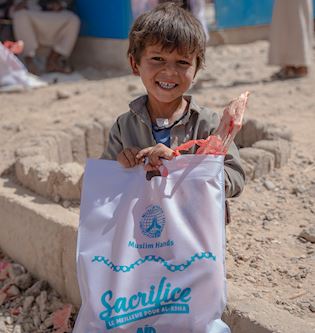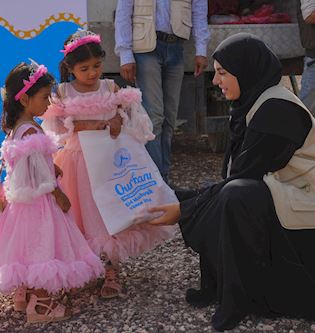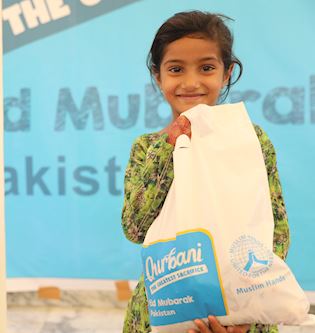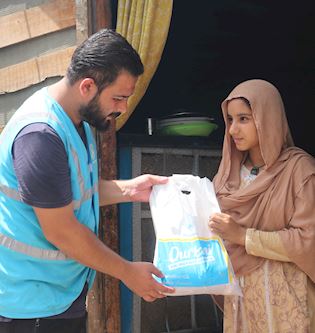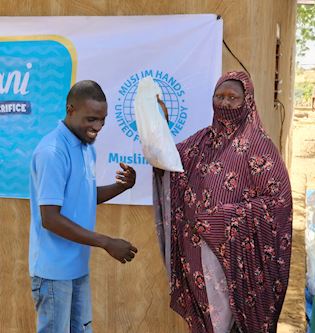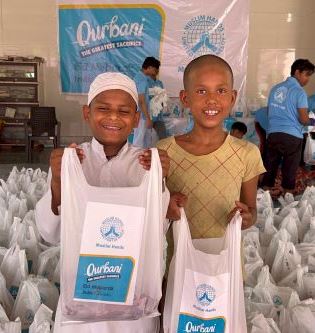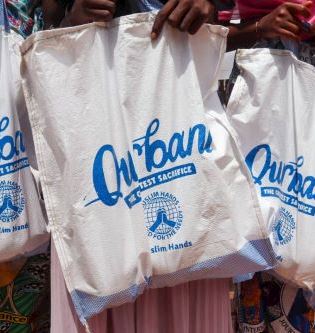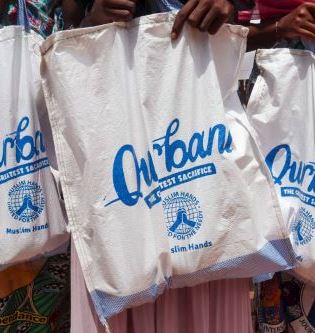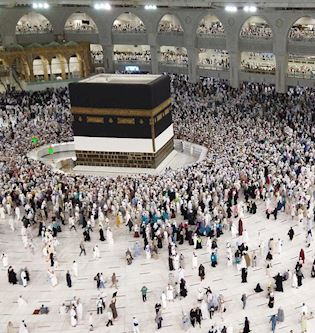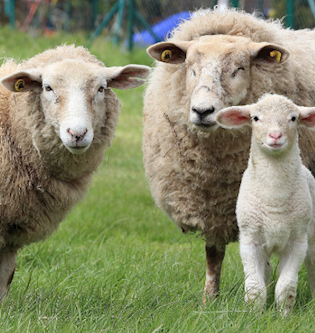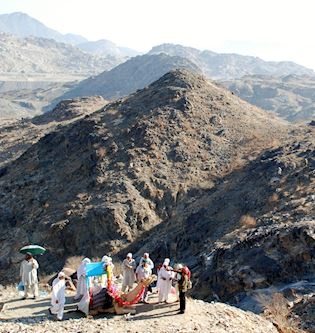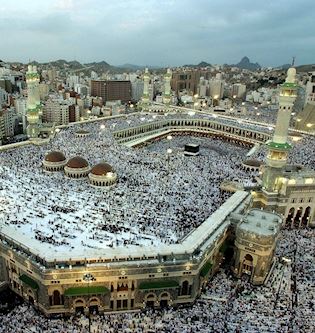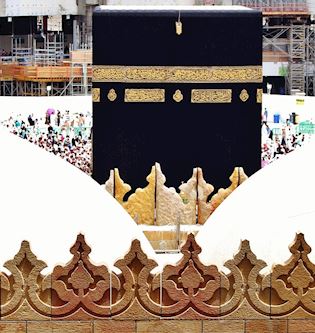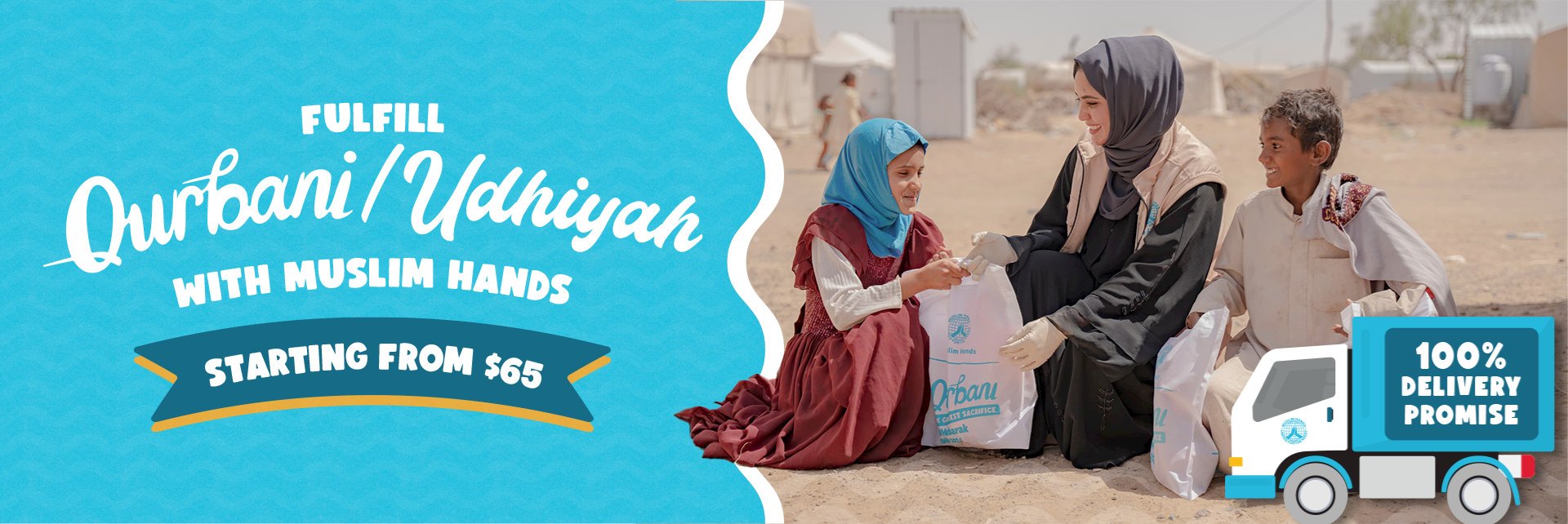
Order your Qurbani/Udhiyah today, starting from $65!
Areas We Serve
Your Qurbani/Udhiyah can tackle hunger in underprivileged communities worldwide. We ensure your contribution reaches those most in need on the days of Eid al-Adha, prioritizing orphans, widows, refugees, and those impacted by conflict.
Lowest Pricing
For as low as $65, your Qurbani/Udhiyah can reach those who need it most. Our teams of experts on the ground ensure your Qurbani/Udhiyah is performed ethically, efficiently, and in line with Islamic principles.
Where Most Needed
Not sure where to give? Our ‘Where Most Needed’ fund ensures your Qurbani/Udhiyah reaches communities in need. Our team of experts allocates your contribution to areas requiring humanitarian assistance.
Give Your Qurbani/Udhiyah
Revive The SunnahFulfill your Qurbani
The holy month of Dhul Hijjah is a time for spiritual reflection, worship, and compassion. Qurbani or Udhiyah refers to the sacrifice of animals during these blessed days.
Starting at $65, fulfill your Qurbani/Udhiyah with Muslim Hands and revive the Sunnah.
We provide a 100% delivery guarantee, ensuring animals are sacrificed stun-free, in accordance with Islamic principles. Meat is distributed fresh, never frozen or tinned, and animals are treated humanely throughout the process.
This year, we are facilitating Qurbani/Udhiyah in emergency zones such as Yemen and Somalia.
We are also distributing meat in India, Pakistan, Senegal, The Gambia, Niger, and Mali. Our dedicated teams are on the ground, working with local partners and farmers, ensuring your Qurbani/Udhiyah reaches those most in need.
Choose your location and budget, or donate to our Where Most Needed fund, allowing us to allocate your Qurbani/Udhiyah to areas facing severe food scarcity.
Last year, thanks to your generosity, we fed thousands of families worldwide.
This Eid al-Adha, fulfill an important religious obligation, and provide a source of nourishment for underprivileged families, many of whom will eat meat for the first time in months.
What is Qurbani or Udhiyah?
The terms ‘Qurbani’ and ‘Udhiyah’ are used interchangeably and refer to the same process. The word Qurbani is rooted in Arabic but has Urdu and Persian roots, it translates to ‘a sacrifice’. Udhiyah has Arabic origins and has a very similar meaning but specifically refers to the sacrificial animal offered during Eid al-Adha. During this holiday, animals are slaughtered between the 10th to 12th day of Dhul-Hijjah.
The meat from the animal is allocated to:
- A third to the poor
- A third to family, friends, and neighbours
- A third is kept for the household
When Should I Give my Qurbani and is There a Deadline?
At Muslim Hands, we will process your contributions up until Eid morning and allocate Qurbani/Udhiyah funds over the three days of Eid Al-Adha. You can make your Qurbani/Udhiyah donations up to a month in advance. If you would like to give your Qurbani/Udhiyah in a certain location, we advise you to make your donation as soon as possible.
Qurbani/Udhiyah takes place after Eid al-Adha salah. If it is performed before Eid salah, this is counted as a Sadaqah, and you will still need to perform Qurbani/Udhiyah after the Eid prayer.
Is Giving Qurbani Compulsory?
Qurbani/Udhiyah is fard (mandatory) for adults who are mentally sound and have the financial means to contribute. This is based on the value of gold and silver. The wealth for Qurbani/Udhiyah is equivalent to 87.48 grams of gold or 61.36 grams of silver. Use the market value of these metals to determine whether you are required to make this contribution.
Different schools of thought have varying opinions on whether Qurbani/Udhiyah is compulsory, however, the consensus is that it is considered a sunnah practice of our Prophet (saw).
Different Schools of Thought Regarding Qurbani/Udhiyah
Regardless of the school of thought you follow; every Muslim believes in the immense virtues of offering a Qurbani/Udhiyah.
Can Qurbani/Udhiyah Be Performed on Behalf of Another Person or the Deceased?
It’s acceptable to perform Qurbani/Udhiyah on behalf of someone else, such as a departed relative. While offering Qurbani for our own family, we can also make the intention to include a departed loved one, so he or she can receive the reward too.
What is Eid al-Adha?
Eid al-Adha translates to the ‘Festival of Sacrifice’ in Arabic. It commemorates the event when Prophet Ibrahim (as) sacrificed his son, Prophet Ismail (as), in obedience to Allah’s (swt) command. As he was about to carry out the sacrifice, a ram took the place of Prophet Ismail (as). This Eid is one of the most important holidays for Muslims, as we are reminded of the loyalty and devotion of Prophet Ibrahim (as) towards Allah (swt).
When is Eid al-Adha 2025?
Eid al-Adha takes place on the 10th of Dhu al-Hijjah, the last month of the Islamic lunar calendar. This Eid coincides with the Hajj pilgrimage. In 2025, Eid al-Adha is expected to take place on Friday, June 6. This date, however, may vary depending on the moon sighting.
Give Sadaqah & Zakat During Dhul Hijjah
The first ten days of Dhul Hijjah are among the most sacred days in Islam. Sadaqah and Zakat during this blessed time bring immense rewards. Whether it’s feeding the needy, supporting a cause, or contributing your Qurbani, every act of giving counts.
The Prophet (saw) said: “There are no days on which righteous deeds are more beloved to Allah than these ten days.” (Bukhari)
Take this opportunity to purify your wealth, help others, and earn multiplied rewards. Give sincerely, give generously.
Automate your Donations this Dhul Hijjah!
Use our simple tool to schedule your donations across the best ten days of the year.
Why is Qurbani/Udhiyah Important?
The Qurbani/Udhiyah ritual is important for several reasons. It represents spiritual renewal, demonstrates obedience to Allah, and revives important Islamic traditions while helping those in need.
Qurbani/Udhiyah is compulsory in Islam for those who meet certain criteria. It is a significant ritual that is a part of Eid al-Adha festivities and Muslims around the world preform this sacred act annually to as an act of obedience and submission to Allah. The act of sacrificing an animal represents the ultimate form of submission to Allah, serving as a way to practice selflessness and devotion.
The meat from Qurbani/Udhiyah is distributed to those in need, ensuring that they can enjoy the blessings of Eid. It is also a means of wealth purification, as it is a form of Sadaqah.
Why Your Qurbani/Udhiyah Matters
Your Sacrifice Can Be a Source of Hope
Where Does Muslim Hands Preform Qurbani/Udhiyah?
Our team works closely with community leaders in several locations across the globe to ensure your Qurbani/Udhiyah meat is distributed to those most in need during the days of Eid Al-Adha. The various locations that we carry out Qurbani/Udhiyah are outlined below.
Emergency Zones:
- Yemen
- Somalia
Other Locations:
- India
- Pakistan
- Senegal
- The Gambia
- Niger
- Mali
Order your Qurbani/Udhiyah today, starting from $65!
Areas We Serve
Your Qurbani/Udhiyah can tackle hunger in underprivileged communities worldwide. We ensure your contribution reaches those most in need on the days of Eid al-Adha, prioritizing orphans, widows, refugees, and those impacted by conflict.
Lowest Priced Pricing
For as low as $65, your Qurbani/Udhiyah can reach those who need it most. Our teams of experts on the ground ensure your Qurbani/Udhiyah is performed ethically, efficiently, and in line with Islamic principles.
Where Most Needed
Not sure where to give? Our ‘Where Most Needed’ fund ensures your Qurbani/Udhiyah reaches communities in need. Our team of experts allocates your contribution to areas requiring humanitarian assistance.
How is Qurbani/Udhiyah Performed?
When making your donation, ensure that you provide the names of all those you are donating on behalf of. For example, one should say “Bismillah, Allahu Akbar. Oh Allah (swt), this is from You and for You on behalf of the name of donor(s).” After the sacrifice is made, one should say, “Oh Allah accept this from the name of donor(s).”
It is strongly encouraged that the person who offers Qurbani/Udhiyah does not cut his hair or nails, starting from the first day of Dhul-Hijjah up until after the sacrifice.
The Prophet (saw) said, “When the ten days (of Dhul-Hijjah) start, and one of you intends to sacrifice, then let him not cut his hair or his nails.” (Muslim)
Once your donation has been processed, we carefully select the animals are to be sacrificed. All sacrificed animals are slaughtered without using stunning techniques and are performed in accordance with Islamic principles.
During Eid al-Adha, we distribute fresh meat that has never been frozen or tinned. You will receive feedback once your Qurbani/Udhiyah is complete.
Our Qurbani/Udhiyah Process
At Muslim Hands, we follow a comprehensive process to ensure your Qurbani/Udhiyah is carried out ethically, efficiently, and in line with Islamic principles.
Planning: Before the Qurbani/Udhiyah period begins, our team works with local partners to assess demand, costs, and suitable locations. We also identify appropriate animals for each region, ensuring they meet all religious and ethical standards.
Animal Selection: We purchase animals in advance, allowing time for thorough health checks and Islamic compliance. Animals are safely transported to remote areas where we re-vet them on and provide proper care until the day where the Qurbani/Udhiyah will take place.
Donor Intention: When donating, provide the names of those on whose behalf the Qurbani/Udhiyah is being performed. The recommended wording includes:
“Bismillah, Allahu Akbar. Oh Allah (swt), this is from You and for You on behalf of (Donor's Name).”
After the sacrifice: “Oh Allah, accept this from (Donor's Name).”
The Qurbani/Udhiyah Process: On Eid al-Adha, our veterinary and procurement teams oversee the sacrifice to ensure full compliance with Islamic guidelines. All animals are slaughtered without stunning practices. It is also highly recommended that anyone intending to give Qurbani refrains from cutting their hair or nails from the beginning of Dhul-Hijjah until the sacrifice is completed, in line with the hadith of the Prophet (saw) (Muslim).
Distribution: On Eid al-Adha, fresh meat is distributed to carefully selected recipients. A few days after your Qurbani/Udhiyah is complete, you’ll receive email confirmation and feedback.
What are the Animal Requirements for Qurbani/Udhiyah?
According to Islamic rules, the following types of livestock animals are permitted: goats, sheep, rams, cows, bulls, buffalo and camels.
Goats, sheep and rams that are sacrificed during Qurbani/Udhiyah must be at least one year old. Cows, bulls and buffalos must be at least two years old. Camels must be at least five years old.
Animals must be owned by the individual offering the Qurbani/Udhiyah. It is also essential that the animal be slaughtered according to Islamic guidelines.
Sick or defected animal cannot be offered as Qurbani/Udhiyah. Animals must be healthy and are carefully selected for this ritual.
Prophet Muhammad (saw) said: "There are four (types of animals) which are not permissible for sacrifice: the one-eyed whose defect is obvious, the sick whose sickness is evident, the lame whose limp is obvious, and the emaciated that no one would choose."
(Sunan Abu Dawood 2802, Sahih)
Who is Eligible to Receive my Qurbani/Udhiyah and How Does Muslim Hands Select Recipients of Qurbani/Udhiyah Meat?
According to Islamic guidelines, the meat from Qurbani/Udhiyah is traditionally divided into three parts:
- One-third is given to those in need
- One-third is shared with family, friends, and neighbours
- One-third is kept for the household
At Muslim Hands, we follow this principle while ensuring that those most in need are prioritized. Recipients typically include widows, orphans, the elderly, individuals with disabilities, and families experiencing poverty or living in crisis.
The selection of recipients is a key part of our Qurbani/Udhiyah planning process. We use a comprehensive set of criteria to assess and verify each household through a needs assessment conducted in advance. This ensures that your Qurbani reaches those who need it most.
How Many Animals are Required for Udhiyah/Qurbani?
Typically, one Qurbani/Udhiyah is offered for every family member, but some schools of thought don’t offer Qurbani/Udhiyah on behalf of babies and children so check with your Imam/religious scholar.
- One sheep or goat or a share in a larger animal, like a cow, equates to one Qurbani/Udhiyah.
- One cow equates to seven Qurbani/Udhiyah shares (One Qurbani/Udhiyah share equals 1/7th of the cow).
You can also choose to follow the sunnah of the Prophet (saw) and offer an extra animal for sacrifice. This is known as a Prophetic Qurbani. The Prophet (saw) gave an additional animal to needy Muslims who could not afford one.
“The Prophet (saw) sacrificed for the one who could not sacrifice from his Ummah, one who bore witness to the Oneness of Allah and [his] Prophethood.” (Tabarani & Ahmad)
The Prophetic Qurbani/Udhiyah
‘The Prophet (saw) sacrificed for the one who could not sacrifice from his Ummah, one who bore witness to the Oneness of Allah and [his] Prophethood’. [Ahmad]
The Prophet (saw) would offer an extra Qurbani on behalf of Muslims who couldn’t afford to. This merciful deed would allow more people from his Ummah to share in the blessings of Eid al-Adha.
There is so much wisdom and compassion in this Sunnah – yet today is neglected. With so many families suffering this year, we are inviting you to revive this beautiful tradition!
By offering a second, Prophetic Qurbani/Udhiyah, you will be doubling your impact, feeding more people during the blessed days of Eid al-Adha. Don’t miss out on these rewards!
How Many People Can be Fed with Qurbani/Udhiyah?
The number of people that can be fed through your Qurbani/Udhiyah depends on the animal that is sacrificed.
Goat or Sheep: Typically yields 18–20 kg of meat.
Cow or Buffalo: Typically yields 120–150 kg of meat.
Which Animals Does Muslim Hands Use for Qurbani/Udhiyah?
The type of animal used for Qurbani/Udhiyah depends on the location you donate to. We typically use sheep, goats, cows, and bulls.
- Small animals such as sheep or goats provide one share
- Large animals such as cows or bulls provide seven shares
You have the option to specify which animal you would like to use for your Qurbani/Udhiyah. The animal that was selected for your Qurbani/Udhiyah will also be specified in your receipt.
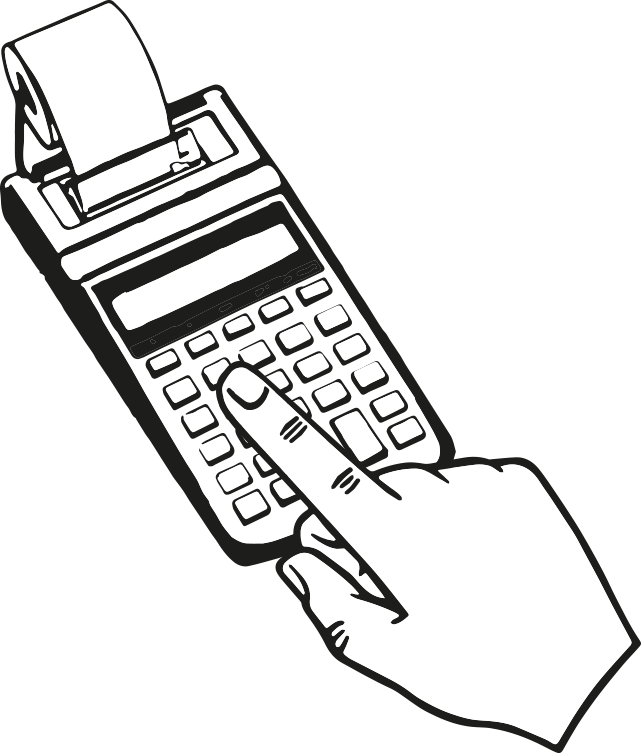
Easily calculate your Zakat
Finding Zakat difficult to calculate? Use our straight forward Zakat calculator to quickly and easily see how much you need to pay.
Calculate nowWill I Receive a Receipt or Feedback Once the Qurbani/Udhiyah is Complete?
Yes, you will receive a receipt once the Qurbani/Udhiyah is complete. This will be provided two or three days after Eid al-Adha. Check our social media platforms, as we provide live updates there as well.
Where Should I Give my Qurbani/Udhiyah?
If you are unsure about where to donate your Qurbani/Udhiyah, we provide the option to give to Where Most Needed so we can allocate your Qurbani/Udhiyah to locations where there is the greatest need.What Does ‘Where Most Needed’ Mean?
Muslim Hands has a ‘Where Most Needed’ fund which provides donors the option to allocate their contributions towards initiatives that urgently require funding. Many donors are unsure about where they should direct their donations. This fund ensures that donations are directed to the areas of the greatest need, offering flexibility in addressing urgent and diverse challenges.
Funds are used to support a wide range of initiatives. What makes this fund special is that your donations can have a far-reaching impact, assisting with everything from emergency aid and livelihood support to well construction and orphan care. Some of the regions we support with this fund include Yemen, Mali, Senegal, Niger, The Gambia, Somalia, and Pakistan.
Can I Pay for Qurbani/Udhiyah with Zakat or Sadaqah?
The distinction between Qurbani/Udhiyah, Zakat, and Sadaqah is essential to understand, as they have different purposes.
Using Zakat funds for Qurbani/Udhiyah is not permissible, as each has it has its own distinct obligation and specific requirements.
With regards to Sadaqah, if you're giving optional (nafl) Sadaqah to help someone else perform Qurbani, it is okay to allocate such funds as Qurbani/Udhiyah. However, you cannot use Sadaqah to fulfil your own Qurbani/Udhiyah obligation.
- Q. When is Qurbani distributed?
- Q. What kind of meat is distributed?
- Q. How do we ensure animals are healthy?
- Q. How many Qurbani(s) am I eligible for?
- Q. Can I Select Which Animal Will Be Used for Qurbani/Udhiyah?
- Q. What Should be Avoided 10 Days Before Eid ul-Adha?
- Q. Are Donor’s Names Mentioned During the Sacrifice?
- Q. Can Qurbani/Udhiyah be Preformed Locally?
- Q. What should I do if I missed a Qurbani in the previous year(s)?
- Q. Can I Select the Villages Where Qurbani/Udhiyah Meat Will be Distributed?
- Q. Can Qurbani meat be distributed to non-Muslims?
- Q. Can I cut my nails or hair if I’m giving Qurbani?
- Q. Will I Receive a Portion of my Qurbani/Udhiyah?
- Q. Is There a 20% Administrative Fee for Qurbani/Udhiyah?
- Q. What is the 100% Delivery Promise?
Muslim Hands teams work hard to ensure that your Qurbani meat is distributed to those in need during the days of Eid al-Adha.
We distribute freshly slaughtered, halal meat from cows, sheep, and goats.
By forging relationships with reputable local farmers, we ensure animals have undergone regular veterinary checkups, are disease-free, and live in hygienic conditions where they are given adequate nutrition, shelter, and water.
One Qurbani equals sacrificing a goat or sheep, or a share in a larger animal, like a cow. Both options are of equal value.
Typically, one Qurbani is offered for every family member -- some scholars deem it unnecessary to offer Qurbani on behalf of babies and children so it’s best to check with your Imam.
1 Sheep or Goat = 1 Qurbani
1 Cow = 7 Qurbani shares (One Qurbani share equals 1/7th of the cow.
Yes, you can specify which animal you would like to use for your Qurbani/Udhiyah.
When offering Qurbani/Udhiyah, it is Sunnah not to cut your hair or nails. Prophet Muhammad (saw) said:
“When the ten days (of Dhul Hijjah) begin, and one of you intends to offer a sacrifice, then let him not cut his hair or nails until he has offered the sacrifice.”
(Sahih Muslim 1977)
It is also recommended to fast on the first day of Arafah.
At Muslim Hands, Qurbani/Udhiyah is performed with the donor's intention in mind, which is the key requirement for the sacrifice to be valid. We do not verbally mention each donor’s name at the time of sacrifice. Islamically, the intention is what validates this act.
Unfortunately, we do not provide this service locally.
You can make up for any missed Qurbanis by either sacrificing an extra animal on the days of Eid al-Adha or by donating the market value of the animal to the poor and needy.
While you cannot select specific villages, you have the option to select the country where your Qurbani/Udhiyah meat will be distributed.
It is permitted to distribute Qurbani meat to non-Muslims, including relatives, neighbors, or those in need. It has been mentioned in the Holy Qur’an: “Eat the cattle and feed the needy and poor.” (Surat al-Hajj: 28)
It is strongly encouraged that the person who offers Qurbani does not cut his hair or nails, starting from the first day of Dhul-Hijjah up until after the sacrifice. The Prophet (saw) said, ‘When the ten days (of Dhul-Hijjah) start, and one of you intends to sacrifice, then let him not cut his hair or his nails.’ (Muslim)
No, unfortunately you will not receive a portion of your Qurbani/Udhiyah.
Yes, a 20% administrative fee is applied for Qurbani/Udhiyah services. This helps cover essential costs such as transportation, meat processing, labour, packaging, and the coordination required to ensure your Qurbani/Udhiyah reaches those most in need.
Our 100% Delivery Promise ensures that your Qurbani/Udhiyah is carried out in full accordance with Islamic guidelines. It also guarantees that the sacrifice will be completed on time and delivered to those most in need during Eid al-Adha.
Qurbani/Udhiyah News
Keeping you updatedStay Connected
For regular updates on our work and the highest quality Islamic content
Sign Up To Our Mailing List
Muslim Hands Canada is an international aid agency and NGO working globally to help those affected by natural disasters, conflict and poverty. Muslim Hands Canada is a registered charity with the Canada Revenue Agency (Charity Registration No. 81126 4985 RR0001).




